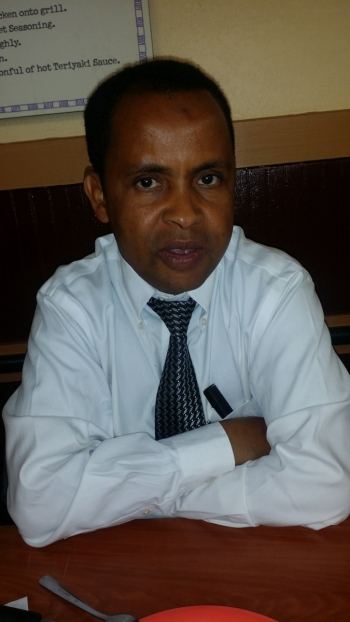Idrissa Balde was 11 years old — still just a boy himself — when he first noticed the suffering all around him in Guinea.
Health care in the West African country was not as advanced as in the United States. Children suffering from malaria, for example, couldn’t get the medicine they needed.
A schoolteacher told Balde’s class about doctors and “how they do treatment at the great big hospitals.” Balde also thought about his uncle, who was a physician.
“This is the way I realized I definitely needed to become one of those doctors to help the community,” Balde said.
Balde has done just that, working with the National Institutes of Health to improve health outcomes in Guinea. And, after earning a Master of Science in biomedical science from Hood College in Frederick, Maryland, he’s continuing his education this fall at Arizona State University, becoming part of the first cohort in ASU’s new online Doctor of Professional Practice in regulatory and clinical research management program.
The doctorate program, out of the Edson College of Nursing and Health Innovation, is the first of its kind in the world, said Barb Marusiak, the senior director of Edson’s clinical research management and regulatory science programs.
“In the clinical research profession, which is everything from biodesign to animal testing to human trials, we haven’t really prepared the workforce for the C-suite level,” said Marusiak, adding that 90% of the students in the program received their master’s degree at ASU. “We have a lot of mid-managers. We have the operations part down really well. But we’ve found that there’s been no foundational base and mentorship that takes them to the next level.
"Who are going to be the ones running these device companies or the pharmaceutical companies? Who’s going to make health policy that involves clinical research. That was our goal, to build that C-suite level.”
Marusiak said the program will also aid health care workers in the discovery and advancement of medical products, as well as the ability to bring them to market.
“One of the things I’ve found is that startups can have a brilliant idea or product, but they have no clue about the commercialization that goes on. When our students get toward the end of the program, we can have them partner with startups and with existing industry partners to see what they have learned and how they can make an impact,” she said.
Balde was 31 years old when he emigrated to the United States in 2003. He didn’t leave Guinea because he wanted to. He left, he said, because he had to.
“A couple of years before I left, there was an election and we (his family) were supporting the opposition,” Balde said. “There was a big protest. And I had some political issues. I was definitely fearing for my safety.”
Balde had graduated from medical school in Guinea a year earlier, in 2002, so upon arriving in the U.S., he worked as an emergency medical technician and a critical care paramedic. After graduating from Hood College, he went to work with The Mitchell Group, a consulting service that helps address needs of U.S. government agencies, nonprofit organizations and private firms across the world.
For the last four years, Balde has been the country coordinator in Guinea, working with the National Institutes of Health on a project aimed to identify why some routine vaccinations are causing amnesia for children.
“It was always my intent to return to Guinea,” Balde said. “And there was a need for someone like myself with my background as a medical doctor and also with my master's in biomedical science, especially with a concentration in immunology, microbiology and immunology.”
Two years ago, Balde realized he could be even more helpful if he augmented his education with clinical research work. He searched the internet, looking for a program that would fit his needs, both in terms of clinical research and the ability to learn online.
When he came across ASU’s online program last April, he didn’t hesitate. He applied immediately and was accepted.
“It is a great, great opportunity for me,” he said. “I cannot afford to abandon my work for five years, so being online was really appealing to me. And it’s directly in the field that I want to concentrate on.
“I know this program is going to help a lot of people, not only in the U.S. but around the world. It means a lot to me.”
More Sun Devil community

No limits to a mother’s love, a wrestler’s determination
Judy Robles was washing dishes in the kitchen of her California home and keeping an eye on her young son, who was playing in the park that backed up to the house.She looked down for a second, maybe…

A symphony of service: Iraq War vet and ASU alum finds healing through music
At the age of 30 and only one credit away from obtaining his bachelor’s degree in piano performance, Jason Phillips could no longer stifle the feeling that he was stuck. He was teaching at a…

ASU first-gen college student is a leader in sustainability, social justice
Born and raised in Phoenix in a single-parent household, Mauricio Juarez Leon faced struggles growing up that included poverty, malnutrition, domestic abuse and limited resource access. And at the…
